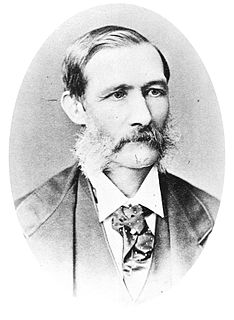
The Chancellor of Austria is the head of government of the Austrian Republic.

The Austrian People's Party is a conservative and Christian-democratic political party in Austria. A successor to the Christian Social Party of the late 19th and early 20th centuries, it was founded immediately following the reestablishment of the Republic of Austria in 1945 and since then has been one of the two largest Austrian political parties with the Social Democratic Party of Austria (SPÖ). In federal governance, the ÖVP has spent most of the postwar era in a grand coalition with the SPÖ. However, the ÖVP won the 2017 election, having the greatest number of seats and formed a coalition with the right-wing populist Freedom Party of Austria (FPÖ). Its chairman Sebastian Kurz was the youngest Chancellor in Austrian history.

Sir Dietrich Brandis was a German-British botanist and forestry academic and administrator, who worked with the British Imperial Forestry Service in colonial India for nearly 30 years. He joined the British civil service in Burma in 1856, shortly after became head of the British forestry administration in all of Burma, and served as Inspector General of Forests in India from 1864 to 1883. He returned to Europe in 1883, dividing his time between Bonn and Greater London. In retirement he dedicated himself to scholarly work, resulting in his monumental book Indian Trees (1906). He is considered the father of tropical forestry and has also been described as the father of scientific forestry. In addition to his work in India, he also had a significant influence on forest management in the United States.
Kurz is a surname. Notable persons with that name include:

The Government of Austria is the executive cabinet of the Republic of Austria. It is composed of the Chancellor, who is head of government, the Vice-Chancellor, and the ministers.
Wilhelm Sulpiz Kurz was a German botanist and garden director in Bogor, West Java and Kolkata.

Marco Kurz is a retired German footballer who currently manages A-League side Melbourne Victory.
Jerry B. Kurz is a founding father of the now-defunct Arena Football League. He was one of the earliest leaders of Arena football, and was part owner of Gridiron Enterprises, original owner of the proprietary, formerly patented, Arena football system.

The 7.92×33mm Kurz is a rimless bottlenecked intermediate rifle cartridge developed in Nazi Germany prior to and during World War II. The ammunition is also referred to as 7.9mm Kurz, 7.9 Kurz, 7.9mmK, or 8×33 Polte. It was specifically intended for development of the Sturmgewehr 44. The round was developed as a compromise between the longer 7.92×57mm rifle and the 9×19mm Parabellum pistol rounds, and is known as an intermediate cartridge.

Sebastian Kurz is an Austrian politician who served as the chancellor of Austria from December 2017 to May 2019. In addition, Kurz has been the chairman of the Austrian People's Party since May 2017.

Legislative elections were held in Austria on 15 October 2017. The Austrian People's Party (ÖVP) emerged as the largest party in the National Council, winning 62 of the 183 seats. The Social Democratic Party (SPÖ) finished second with 52 seats, slightly ahead of the Freedom Party of Austria (FPÖ), which received 51 seats. NEOS finished fourth with 10 seats, and PILZ entered parliament for the first time and came in fifth place with 8 seats. The Green Party failed to cross the 4% threshold and was ejected from parliament, losing all of its 24 seats.

The Kern government was the Government of Austria, in office from 18 May 2016 to 18 December 2017. It succeeded the Second Faymann government, following the resignation of Chancellor Werner Faymann amidst the 2016 presidential election, and was succeeded by the First Kurz government following the 2017 federal election. The cabinet was appointed by outgoing President Heinz Fischer.
Events in the year 2017 in Austria.

Legislative elections were held in Austria on 29 September 2019, to elect the 27th National Council, the lower house of Austria's bicameral parliament. The snap elections were called in the wake of the collapse of the ruling ÖVP–FPÖ coalition and the announcement of Vice Chancellor Heinz-Christian Strache's resignation on 18 May 2019, following the Ibiza affair.

The FirstKurz government was the national government of Austria in office from 18 December 2017 until 3 June 2019. It succeeded the Kern government, following the 2017 election. Sebastian Kurz, leader of the centre-right ÖVP, reached an agreement on a coalition with the far-right FPÖ, making him chancellor of Austria. The cabinet was appointed by President Alexander Van der Bellen.

Brigitte Bierlein is an Austrian jurist serving as Chancellor of Austria since 2019. An Independent, she was the advocate general of the Procurator's Office – essentially the country's chief public prosecutor – from 1990 to 2002, as well as a member of the executive board of the International Association of Prosecutors from 2001 to 2003. In 2003, Bierlein was made a member of the Constitutional Court. Between January 2018 and June 2019, she served as President of the Constitutional Court, the first woman to hold the position.
Events from the year 2019 in Austria.

The Ibiza affair, also known as Ibiza-gate, was a political scandal in Austria involving Heinz-Christian Strache, the former vice chancellor of Austria and leader of the Freedom Party (FPÖ), and Johann Gudenus, a deputy leader of the Freedom Party.

The Bierlein government is the current interim government of Austria. It was sworn in on 3 June 2019, following the termination of the First Kurz government in the aftermath of the Ibiza affair. It is the first purely technocratic government in Austria, the first interim government after a successful motion of no confidence, and Bierlein is the first female Chancellor of Austria.









